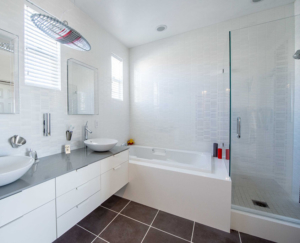Discover the Pros and Cons of Using Corian Shower Walls: A Comprehensive Guide
KEY POINTS
- The article discusses the pros and cons of using Corian as a material for shower walls.
- Corian is a solid surface material known for its durability, non-porousness, easy maintenance, and modern look.
- Corian shower walls offer a lot of design flexibility, as it comes in a wide range of colors and patterns.
- More information about Shower Surrounds
 Corian is a brand of solid surface material that is commonly used in the construction of shower walls. This material is made from a combination of acrylic polymer and natural minerals, resulting in a durable and versatile material that can be used in a variety of different applications. However, like any building material, there are pros and cons to using Corian in shower walls.
Corian is a brand of solid surface material that is commonly used in the construction of shower walls. This material is made from a combination of acrylic polymer and natural minerals, resulting in a durable and versatile material that can be used in a variety of different applications. However, like any building material, there are pros and cons to using Corian in shower walls.
One of the main benefits of using Corian for shower walls is its durability. Corian is a non-porous material, which means that it does not absorb water and will not stain or discolor over time. This makes it an ideal choice for shower walls, as it will not be affected by the moisture and humidity that is present in the bathroom. Additionally, Corian is a very hard material that is resistant to scratches, dents, and other types of damage.
Another advantage of Corian shower walls is that it is very easy to clean. The non-porous surface does not allow bacteria or mildew to grow, and it can be easily wiped clean with a damp cloth. This makes it a great option for people who are looking for a low-maintenance shower wall option.
Corian shower walls also offer a sleek and modern look. Corian comes in a wide range of colors and patterns, and can be shaped and cut to fit any bathroom design. This allows for a lot of creative freedom and flexibility when designing a shower space.
However, Corian shower walls also have some downsides. One of the main cons is that it is relatively expensive. Corian is a premium building material, and the cost can be quite high when compared to other options such as ceramic tile or fiberglass. Additionally, Corian is not as heat resistant as other materials and can be damaged by high temperatures. This means that it is not recommended to install a steam shower with Corian walls.
Another downside of Corian shower walls is that it is not as flexible as other materials. While Corian can be cut and shaped to fit a variety of designs, it is not as easy to work with as tile or fiberglass. This can make installation more difficult and time-consuming, and may require the services of a professional contractor.
In conclusion, Corian shower walls offer a number of benefits such as durability, easy maintenance, modern look and design flexibility. However, the high cost, lack of heat resistance and difficulty of installation may be a drawback for some. Ultimately, whether Corian is the right choice for your shower walls will depend on your personal preferences, budget, and the specific needs of your bathroom.

